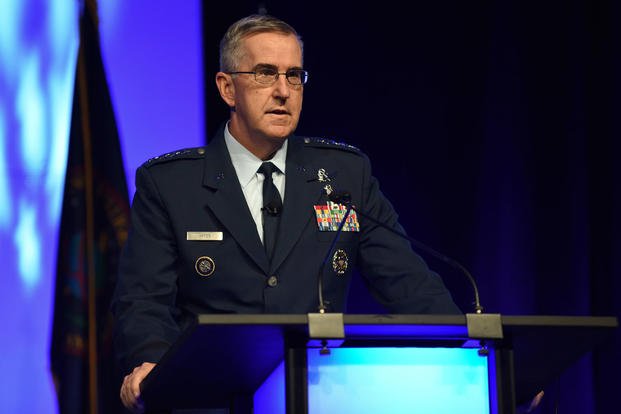There is a way to keep savings and cut costs when it comes to modernizing the U.S. nuclear arsenal: make sure your adversary reduces, too, the head of U.S. Strategic Command said Wednesday.
"You want to know how to get those savings? Sit down with the Russians and say 1,550 [nuclear warheads] is actually not the right number; maybe it's 1,400," said Air Force Gen. John Hyten.
Hyten spoke at an event, "Nuclear Deterrence is Dead, Long Live Nuclear Deterrence," hosted by the Harvard Kennedy School Institute of Politics.
While Hyten wouldn't cite specific minimums, the general said the U.S. does keep "an analysis we can give the diplomats if they want to negotiate."
"But if you want to save money, change the threat. Don't change the level of security in this country, change the threat," Hyten added, referring to the adversary nation's behavior in a conflict.
Related content:
- Pentagon Nuclear Recap Programs May Slow with Democrats in House
- No Move to Speed Up New Nuclear Cruise Missile Development
- Auditors to Air Force: Don't Be Short-Sighted on Nuclear Comms
An additional way to stave off tension is to keep agreements such as the 2011 New Strategic Arms Reduction Treaty (START) in place, Hyten explained.
New START limits the amount of weapons both the Russians and U.S. can use across its triads to 1,550 nuclear warheads. The treaty is due for recertification in 2021, but the Trump administration has said the U.S. may ditch arms control treaties it disagrees with, notably the Intermediate-Range Nuclear Forces Treaty. It remains unclear if New START may also be in the crosshairs.
"I like arms control treaties that limit nuclear weapons," Hyten said. "I think when you negotiate with somebody and they have nuclear capabilities, everything should be on the table -- everything we have should be on the table, everything they have should be on the table."
He cited the way the U.S. and Russia continue to observe each others' weapons stockpiles to ensure compliance with the treaty. For example, Russian officials travel each year to either Ellsworth Air Force Base, South Dakota, or Dyess Air Force Base, Texas, to review whether the B-1B Lancer bomber fleet complies with the treaty, which specifies it must remain disarmed.
"I don't mind showing our capabilities to the Russians. I don't know what they think about us showing up, but I don't care -- it helps me to understand what their capabilities are," he said. "It helps prevent surprises. Arms control is a good thing."
That's not to say nuclear weapons should be totally eliminated, Hyten said; in order to deter other nations, he said, the U.S. "has to have" nuclear weapons of its own.
"When Congressman [Adam] Smith asks me, and he has, I'll tell him ... same thing I told him last year, and the year before: as the STRATCOM commander, my advice is that we need to have a force that can respond to any threat that is in the world today," he said, referencing the incoming chairman of the House Armed Services Committee, a Democrat from Washington.
That requires the nuclear triad, he said, which includes the ability to launch missiles from land, aircraft and submarines.
Without it, "I can't guarantee that the U.S. will have the ability to respond, which means I can't guarantee the security of this country," he said.
"We going to have to invest as a nation in these capabilities," he said, in order to safely and securely conduct a mission should it be required.
In reality, "it's expensive," Hyten said.
Hyten credited President Barack Obama for first recognizing the need to begin the modernization of the U.S. nuclear arsenal.
Nuclear proliferation discussions in recent months have focused in large part on the Trump administration's 2018 Nuclear Posture Review, which calls for a significant weapons boost.
"This is an American issue. For survival. That's what it's about," Hyten said.
Democrats Say 'No' to Nukes
But new Democratic-led leadership may not agree with that military rhetoric.
Back in Washington, D.C., some democrats including Smith have said they will not tolerate "bad nuclear" policies, referring to the Nuclear Posture Review, or support low-yield nuclear weapons.
"We cannot afford what they are talking about," Smith said during a Ploughshares Fund event, an nonprofit organization that advocates against the global use of nuclear weapons.
"What I'm hoping we can do going forward is sort of reset our policy on nuclear weapons and how we avoid nuclear war," Smith said. "I think we need to fundamentally rebuild our nuclear strategy and to use it as a deterrent, not as this overwhelming force."
Like Smith, Sen. Ed Markey, a Democrat from Massachusetts, blasted Trump administration modernization efforts that he said would "embrace a new global nuclear arms race" by introducing weapons such as the W76-2 submarine-launched tactical nuclear warhead into the arsenal.
Markey said carrying such a warhead on submarines used for strategic purposes creates a higher risk of miscalculation.
The administration is "misleadingly calling [these types of weapons] low-yield, as if such a thing as a diet nuclear weapon exists," Markey said.
"There is no such thing as a zero-calorie chocolate fudge sundae, and there's no such thing as a low-yield nuclear weapon. It is a nuclear weapon, period," Markey said.
Markey said he would reintroduce his "No First Use" bill with Rep. Ted Lieu, D-Calif., as an extra check on the president's authority to launch a nuclear weapon. He also plans to introduce a bill to "reign in expenditures" for nuclear modernization efforts.
Alongside Smith, Lieu and Reps. Jim Garamendi, D-Calif., and Earl Blumenauer, D-Ore., Markey also plans to reintroduce a bill to defund low-yield nuclear weapon development and deployment.
"And I will fight tooth and nail against the low-yield nuclear warhead, an unnecessary and dangerous weapon," Markey said.
-- Oriana Pawlyk can be reached at oriana.pawlyk@military.com. Follow her on Twitter at @oriana0214.










